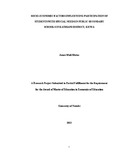| dc.description.abstract | Disability can be explained in terms of any restriction that results from
impairment and hinders a person from performing an activity within the range
considered normal for a normal person (Heward, 2006, Hardman, Drew & Egan,
2005). Inclusive education has become a critical part of the reform effort to
improve the delivery of services to students with disabilities by focusing on the
placement of these students in general education classes. The purpose of the study
was to assess the social–economic factors influencing participation of students
with special needs in public Secondary school in Kathiani District - Kenya. The
research objectives of the study were:-to establish the extend to which school
learning facilities are supportive to students with special needs in public
Secondary schools in Kathiani District, to assess how parents level of education
influences participation of students with special needs in Public Secondary
schools in Kathiani District, to determine how family income influences
participation of students with special needs in Public Secondary Schools in
Kathiani District and to assess the extend to which cost of education affects
participation of students with special needs in public Secondary School in
Kathiani District. The study employed descriptive survey. The study sample in
total consists of sample of 567 respondents. The research instruments used were
questionnaires, interview schedule and document analysis. Quantitative data was
analyzed using Statistical Package for Social Sciences (SPSS) and the results
were presented using frequency tables, pie charts, bar graphs and percentages to
make meaningful conclusions. On the influence of parental level of education on
special needs student’s participation in public secondary schools, the study
revealed 80 percent of the students came from homes whose parents have
secondary education and above and 100 percent of the students were found to
have parents with higher level of education. In general the study established that
there are social-economic factors that influence the students’ participation in
public secondary schools. These factors include, the patents level of education
where children with special needs from household with educated parents
dominates in inclusive education because parents attach value to education, the
financial status of the parents where financially stable parents send their children
to school while financially unstable parents are unable to pay school fees making
their children rely on well wishers, the church and their relatives to meet school
expenses. The other factor includes, the cost of education and school learning
facilities such as classes, text books, libraries and laboratories. The study
recommends that school management should have in place infrastructure and
school facilities that are tailored towards students with special needs for them to
participate in secondary school education. Further the study recommends that
parents should be sensitized on the important of education so that they can put in
more effort in enabling their children with special needs access secondary
education. The study further recommends that the government and other
stakeholders should come up with special funding policies to enable students with
special needs access secondary education e.g. bursaries and other grants from
donors and well wishers. | en |

